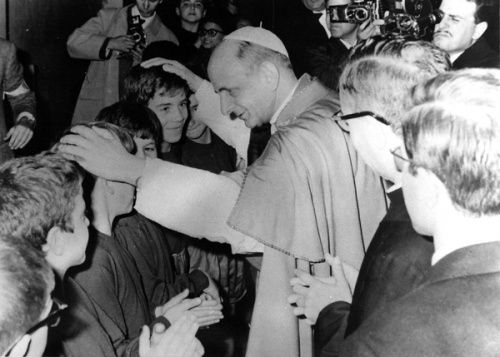
We cannot forget that our Faculty was erected as such in 1969, during his Pontificate. This recognition of the task begun a few years earlier with the encouragement of St. Josemaría Escrivá is part of the theological impulse that St. Paul VI wanted to give to the Church in the years following the conclusion of the Second Vatican Council.
In October 1999, I had the opportunity to prepare some words of welcome to the participants in a Study Days on "...".Modern man in search of God, according to the Magisterium of Paul VI"I would like to recall with gratitude some of the testimonies about Paul VI that, for various reasons, are connected with this Faculty of Theology. On that occasion, I wanted to recall with gratitude the memory of some testimonies about Paul VI that for various reasons are related to this Faculty of Theology and are therefore particularly dear to those of us who work here.
Today, twenty years later, I think that the canonization by Pope Francis is a good reason to remember them again.
Let us begin with a detail, merely anecdotal but significant, which refers to the first occasions on which a professor of our Faculty was personally received by Paul VI, although at the time of those meetings, 1943, Professor Orlandis, a professor at the University of Murcia and a young researcher, was not yet a professor of this Faculty, and John Baptist Montini was not yet Paul VI.
On one of the occasions on which they had arranged to meet, the previous audience went on a little longer than usual and the usher in charge of introducing the visitors to Monsignor Montini's office felt it his duty to give conversation to Fr. José Orlandis to liven up the wait.
"In the talk came up, as a confidence," recalls Prof. Orlandis, "the opinion that Montini deserved and the image that he presented before his eyes, so accustomed to contemplate him so closely. The definition, said in the popular language of an old Roman, was so funny to me," Orlandis continues, "that I could never forget it.Monsignore è proprio un santo: lavora sempre, quasi non dorme e mangia come un uccelletto!"".
This definition, somewhat singular in its form, is nonetheless an expressive testimony of the capacity for work and the affection that John Baptist Montini aroused in those who witnessed his daily work..
On the occasion of another meeting, on January 21, 1945, Professor Orlandis gave the future Pope Paul VI a copy of The Way, which St. Josemaría Escrivá had sent to him in Rome a few days earlier. Well, that book would not remain abandoned on the shelves of a library, but would also have its own history, which we have been able to learn about many years later.
Photograph taken during St. Josemaría's audience with Paul VI on January 24, 1964.
Granted by Pope Paul VI to Blessed Álvaro del Portillo thirty years later, that is, in 1975, shortly after the death of St. Josemaría, he spoke to his successor as head of Opus Dei about that book, which he still kept with great care.
This is how Bishop del Portillo recalled that conversation: "Paul VI spoke to me about Father with admiration and told me that he was convinced that he had been a saint. He confirmed to me that for many years he had been reading The Way every day and that it did great good to his soul" (Álvaro del Portillo, Interview on the Founder of Opus Dei, p. 18).
Paul VI's affection for St. Josemaría was already evident from the time he had the first references to him. and of the apostolic work he was carrying outMontini paid out of his own pocket the expenses for the granting of the appointment of Domestic Prelate of His Holiness that Blessed Álvaro del Portillo had requested for St. Josemaría Escrivá (Álvaro del Portillo, Interview on the Founder of Opus Dei, p. 18).
Bishop Montini and Josemaría Escrivá had the opportunity to meet for the first time in 1946 on the occasion of the founder of Opus Dei's first trip to Rome. St. Josemaría recalled all his life, and said it repeatedly, that Bishop Montini was the first friendly hand he met on his arrival in Rome, and he always had a cordial affection for him.
When Josemaría Escrivá When he was received in audience by Paul VI, he was deeply impressed to see in the Holy Father the kind face he had met in the Vatican offices on his first trip to Rome.
I seemed to be seeing once again the kind smile, and hearing again the kind words of encouragement (they were the first I heard in the Vatican) of Bishop Montini in 1946: but now it was Peter who smiled, who spoke, who blessed" (Letter 14 Feb. 1964. The text of this letter can be found in A. de Fuenmayor - V. Gómez Iglesias - J. L. Illanes, El itinerario jurídico del Opus Dei, p. 574).
They are simple reminders of recent history that bear witness to the human category
Mr. Francisco Varo Pineda
Director of Research at the University of Navarra.
Professor of Sacred Scripture at the Faculty of Theology.